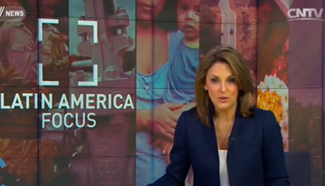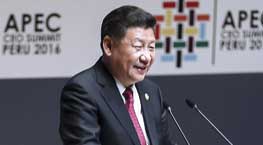BEIJING, Dec. 28 (Xinhua) -- China's 13th Five-Year Plan (2016-2020) period has had a strong start and is poised to fulfill all key targets set by the central government for economic development.
The latest sign of a warming economy came on Tuesday as the National Bureau of Statistics said industrial profits expanded 9.4 percent year on year in the first 11 months, faster than the 8.6-percent rise for the first 10 months.
Although full-year statistics have yet to be released, all indicators suggest China will reach its main targets this year, including a GDP growth rate of 6.5 to 7 percent, creation of over 10 million new urban jobs, and a 3.4-percent decline of energy consumption per unit of GDP.
The GDP grew by 6.7 percent in the first three quarters. Experts expect the full-year growth rate to be near the same level as the first nine months.
As an important barometer of the overall economy, China's manufacturing Purchasing Managers' Index (PMI) rose to 51.7 in November from the previous month's 51.2, marking its strongest pace in more than two years.
The stronger-than-expected PMI data added to evidence that China's economy has been stabilizing and is on track to meet the government's annual growth target.
Per-capita disposable income of residents rose 6.3 percent in the first three quarters, slightly lower than the average annual target of more than 6.5 percent in 2016-2020.
With 55.75 million people still living under the poverty line at the end of 2015, China aims to lift all its poor population out of poverty by 2020 as one of the major tasks to build an "all-round moderately prosperous society."
Central and local government spending on poverty relief exceeded 100 billion yuan (14.4 billion U.S. dollars) for the first time, and China will fulfill this year's target of bringing 10 million people out of poverty ahead of schedule, according to a national meeting earlier this month.
Liu Yongfu, head of the State Council Leading Group Office of Poverty Alleviation and Development, said the country will work on several fronts in 2017: promoting industrial development in poor regions; giving the poor easier access to employment services, health care and education; and improving infrastructure facilities in poor regions.
China has also met this year's targets in advance for reducing outdated capacity in the coal and steel sector, which will help improve corporate profitability, optimize structure and balance market supply with demand.
Driven by intensified efforts to protect the environment, China's energy use per unit of GDP dropped 5.2 percent in the first three quarters and total coal consumption dropped by 2 percent, resulting in better air quality.
And the list of encouraging signs goes on.
However, a complicated external and domestic economic environment has left China little room for complacency.
Weak growth momentum in major economies, flagging international trade, some backsliding on globalization and rising trade protectionism added to uncertainties for global economic recovery.
Global trade growth has been slower than world economic growth for five consecutive years and the trend is likely to continue.
At home, daunting challenges, including debt overhangs, excess capacity and a highly leveraged property market should not be taken lightly either.
Wang Yiming, deputy director of the Development Research Center of the State Council, said China should be sober-minded about the risks by taking active measures to avoid further accumulation and spread of risks.
China has made "seeking progress while maintaining stability" the main theme for economic work in 2017, pledging to push for substantial progress in supply-side structural reform, according to the Central Economic Work Conference.
By doing so, China will consolidate a foundation for steady economic growth and attain major targets in realizing an all-round moderately prosperous society.











